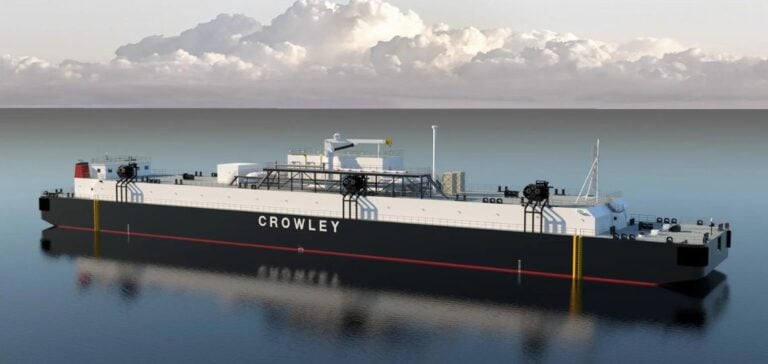Crowley recently took delivery of the Progress liquefied natural gas (LNG) bunker barge, the largest Jones Act-compliant vessel of its type in the United States.
This significant achievement for the marine industry was made possible through collaboration with Fincantieri Bay Shipbuilding and Shell NA LNG, LLC.
The Progress, now operational at the Port of Savannah in Georgia, offers an advanced solution for LNG bunkering, meeting the growing clean energy needs of marine operators.
Cutting-edge technological innovation
The Progress vessel is 416 feet long and has an impressive capacity of 12,000 m³ of LNG, or 3.17 million gallons.
Designed by Crowley’s engineering group, in partnership with Shell, the barge incorporates advanced technologies for efficient and reliable bunkering.
These innovations enable the flexible distribution of LNG to different types of containment systems, enhancing the efficiency and safety of bunkering operations.
James C. Fowler, Senior Vice President and General Manager of Crowley Shipping, points out that this barge sets a new standard for quality and capacity in the bunkering sector.
“LNG offers a safe and reliable solution for ocean carriers, supporting the transition to lower emissions,” he says.
Key role for Fincantieri Bay Shipbuilding
Fincantieri Bay Shipbuilding, a major player in the shipbuilding industry, played a central role in the realization of this project.
Jan Allman, the company’s Vice President and General Manager, expresses his pride in his team’s contribution.
“We’re proud to see another FBS-built vessel set sail for its operational home port,” he says.
This project consolidates Fincantieri’s position as a leader in the construction of LNG bunkering barges, highlighting their expertise and commitment to technological innovation.
Environmental impact and future prospects
LNG is currently the lowest-carbon marine fuel available on a large scale, reducing greenhouse gas emissions by up to 23% compared with ultra-low sulfur oils.
The importance of this technology is crucial to the emission reduction targets of the global marine industry.
Crowley, a company with over 130 years of innovation, continues to invest heavily in sustainable shipping solutions.
With over 170 vessels and operations in 36 countries, Crowley remains a key player in global trade.
Their investment of over $3.2 billion in the sector reflects their commitment to sustainability and innovation.
Crowley’s acceptance of the Progress barge represents a major milestone not only for the company, but also for the US marine industry as a whole.
This initiative demonstrates how innovations in LNG bunkering can help reduce global greenhouse gas emissions, while supporting the sustainability goals of shipping companies.
The transition to cleaner fuels is essential for the future of the marine industry.
Crowley and its partners, such as Shell and Fincantieri, are playing a crucial role in this transformation by developing innovative solutions and investing in cutting-edge technologies.
These efforts will contribute to a more sustainable future for global shipping.






















